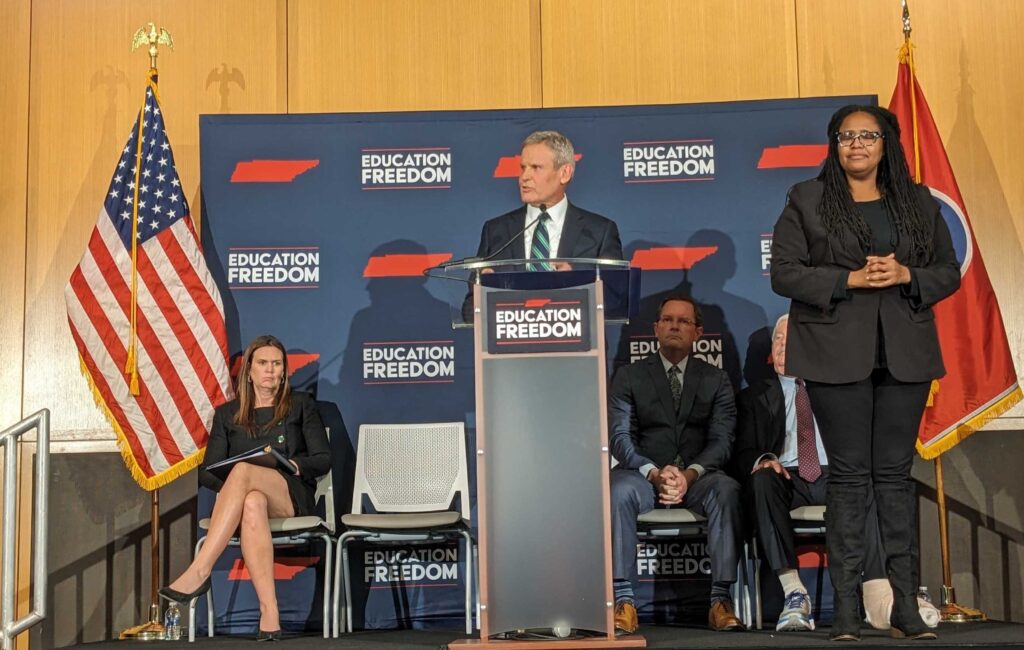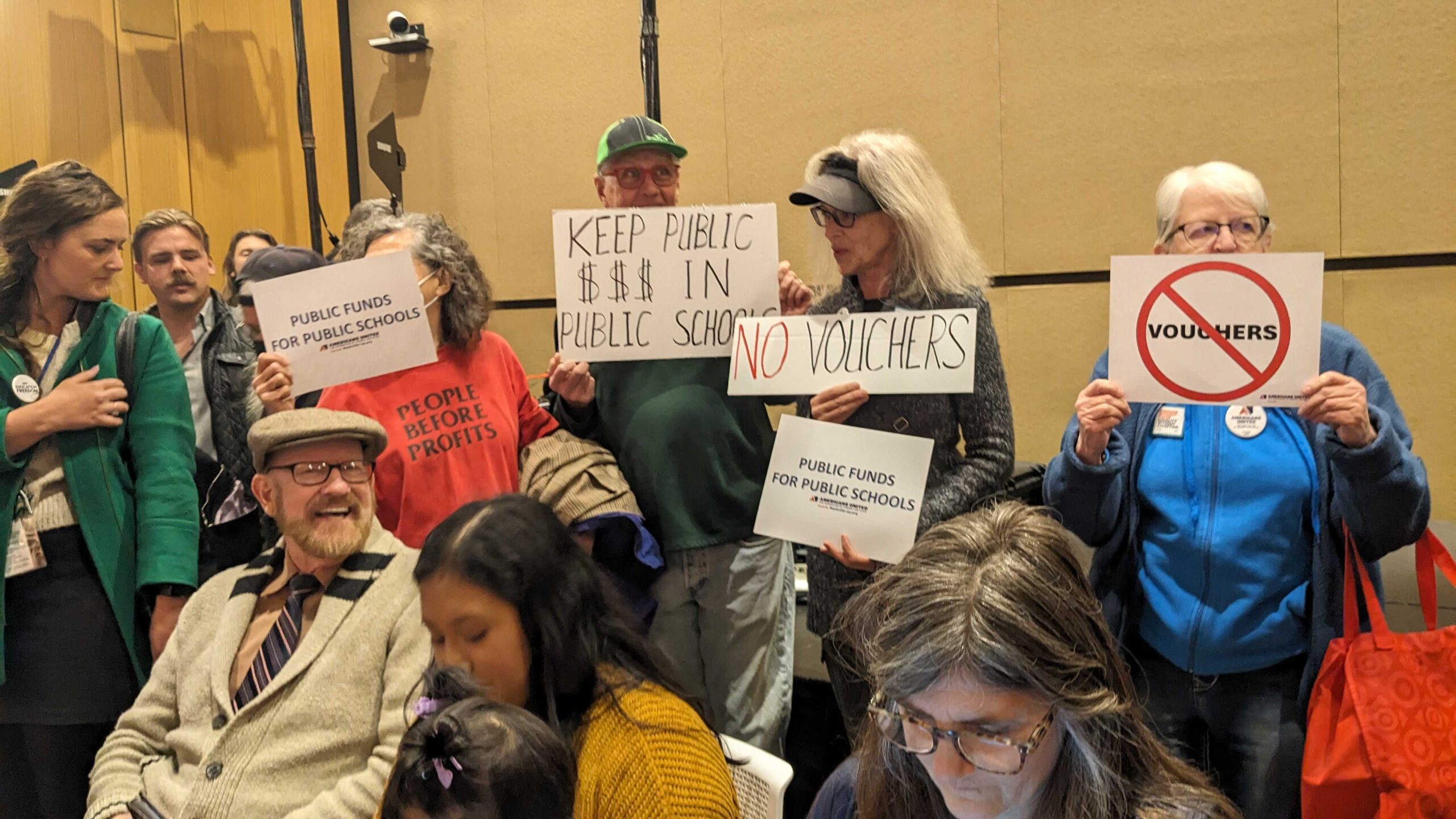
Gov. Bill Lee announced his support Tuesday for expanding a controversial school voucher program to all income levels and areas of Tennessee. The program, which the Lee administration is calling “Education Freedom Scholarships” would give participating families a little over $7,000 to attend private school or homeschool.
“Parents know best what’s best for their child as it relates to education. And that’s the underlying factor and the premise that we operate from today,” Lee said from a stage at the Tennessee State Museum.
Leaders of the Tennessee General Assembly joined him at the event as well as Arkansas Gov. Sarah Huckabee Sanders, whose state passed a universal voucher law earlier this year.
“There is an absolute conservative education revolution happening in our country and I wanted to be part of it here in Tennessee,” Sanders said.
Tennessee’s current voucher program
The proposal builds on a pilot program which is currently limited to low and middle income students in Davidson, Shelby and Hamilton counties.
The Education Savings Account (ESA) program allows families to receive more than $8,000 to put toward tuition, as well as other educational costs, like books, uniforms and transportation. Eligible families can earn no more than double the federal income cap for free lunch. The schools that accept ESAs must be approved by the state.
The program is currently operating well below capacity. This school year, a maximum of 7,500 students could receive an ESA. But as of Nov. 27, Tennessee’s Department of Education had approved fewer than 2,650 applications. And fewer than 2,000 students had actually enrolled using their ESA.
Still, Republicans say families have been pleased with the program, pointing to a 91% satisfaction rate among parents.
What’s in the new proposal
The Education Freedom Scholarship Act would greatly expand capacity and eligibility for vouchers. If passed, it would begin in the 2024-25 school year with 10,000 seats reserved for students who qualify for the current pilot program, students with disabilities, and kids from families that earn 300% of the federal poverty level or less. The other 10,000 seats would be open to any student “entitled to attend a public school.”
Then, during the next school year, all 20,000 grants would have universal eligibility, regardless of families’ income levels — or whether they were already enrolled in private school without state help. The governor says students with the greatest need would be prioritized.
Many aspects of the plan, including funding details, are still unclear. However, Republican House Speaker Cameron Sexton said “This scholarship opportunity is funded outside the current K-12 funding model, TISA, which means dollars do not follow students.”
Still, critics say public money should remain in the public school system. A handful of protesters showed up to Tuesday’s announcement event to voice their opposition to the plan.
 Alexis Marshall WPLN News
Alexis Marshall WPLN NewsDemonstrators held signs opposing Gov. Bill Lee’s universal school voucher program Tuesday afternoon.
Critics surface wide-ranging concerns
Tanya Coats is president of the Tennessee Education Association, which represents teachers and other school workers across the state.
“The proposal allows for unaccredited, unproven and unaccountable private schools to siphon public funding away from the local school district,” she wrote in an emailed statement.
In an interview, Coats also responded to Lee’s assertion that universal vouchers would expand school choice for parents, saying families already have options.
“Our parents can choose which school they want their student to attend in any district,” Coats said.
Tennessee requires districts to offer open enrollment, allowing kids to attend someplace other than where they’re zoned. And parents can request to send their kids to an out-of-district school.
Coats also pointed to data showing that students in Tennessee’s current voucher program performed worse than their public school peers.
Local education leaders have criticized the proposal, too. Metro Nashville Public Schools board chair Rachael Anne Elrod released a statement on social media blasting the voucher plan.
“It is moral and fiscal malpractice for Tennessee to dismantle and destabilize public education,” Elrod wrote.
And the criticism is not limited to leaders in urban areas. Cheatham County’s director of schools Cathy Beck wrote in an emailed statement that vouchers don’t begin to cover the cost of attending private school and could become a “discount for the wealthy.”
Recent history
Tennessee narrowly passed its voucher pilot program in 2019. At the time, Republican House Speaker Glen Casada held the vote open for about half an hour and convinced Knoxville Rep. Jason Zachary to change his vote in favor of the proposal, with an assurance it wouldn’t affect Zachary’s district. The pilot program only applied to Davidson and Shelby counties.
A lawsuit held that program up in the courts for years. Then, in 2022 the state rolled out ESAs at the start of the school year. In 2023’s legislative session, Republican lawmakers expanded the program to include Hamilton County.

